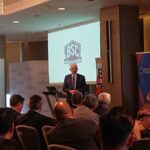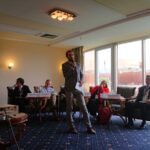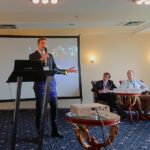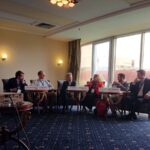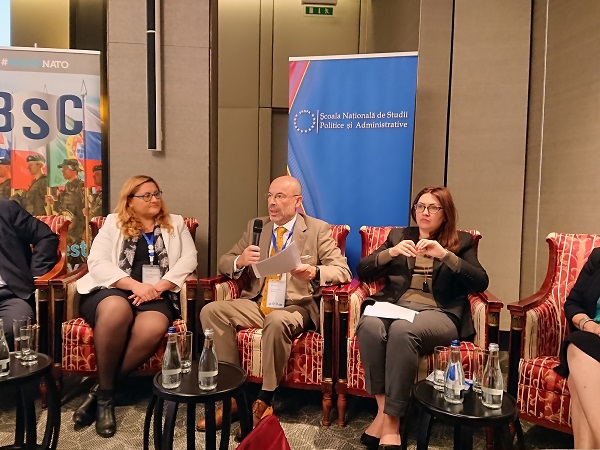
4-5 October 2019, Bucharest, Romania
By Miltiadis Koustas
On October 3rd, 2019 I traveled to Romania in order to participate in the Bucharest Security Conference, which took place at the Intercontinental Hotel (October 4th & 5th). The trip took place in the context of the project “A new narrative for Europe: Bringing more union into the European Union” which was co-funded by the Europe for Citizens Programme of the European Union.
He stated how trust and security has gradually worn out, over these last decades, due to the neglect shown by some country leaders. And how important it is, now more than ever, that each country should help its neighbouring ones.
On the first session, a fear was expressed that what is currently happening in Crimea, should act as a premonition of what might happen in the Mediterranean in a couple years, and that the security budgets should be increased. Teodor Meleșcanu, Oana Lungescu and Gabriel Leș stressed the importance of reinforcing the transatlantic alliance and strengthening the relationship between NATO and Europe. They also stated that year by year, NATO troops are on constant standby to help those in need. Oana said that more women should join the defense and security sector of each country. Brig. Gen. Cristian Bizadea focused on the importance of always telling the truth and exposing the lies that other parties or groups are spreading.
Romania wants to make the transition to Euro as smoothly as possible, and believes that economic growth is not enough, but further growth in construction is also needed. Also, after a gallop in which a large part of the population participated, they discovered that the majority, especially the younger people, cared more about an increase in their standard of living than joining the rest of Europe.
On the second panel (How to Project Stability in our Eastern Neighborhood and in the Western Balkans?) Maj. Gen. Carlos Branco said that NATO is a dialogue platform with Russia and should be used as such. Alina Inayeh also stated the importance of educating people so that they won’t fall victim of fake news spread throughout Europe.
On the second day of the Conference, on the sixth panel (Street Protests and Civic Mobilization – Current Challenges to Social Resilience – Views from Civil Society), Andrei Luteno argued that, because of the fact that the amount of people who are partaking in protests is withering each year, there should be a new kind of constant movement that is always ready for action. Pressure should be applied on the correct government officials, and the people should always have information on current issues. The best way to achieve change is through right use of social media, displaying the government’s wrongdoings so that everyone can be aware of them.
Philipp Raab and Gustav Spät focused on the importance of learning about politics and human rights at a young age. Activist parties are trying to communicate with younger audiences through YouTube channels and social media.
Luca Ciubotaru mentioned that nowadays, young people are interested in politics, and are more active than they used to. But they need to have a clear understanding of what they are fighting for. In cities with no prior history in rallies, young people flooded the streets. There are people who wish for change to happen, they just don’t have a way or platform through which to channel their energy.
Alvaro Oleard began by saying that most people who actively help in activism causes, belong in the middle or high classes of society. He stated that if the government doesn’t listen to or care about the people’s demands, people will stop being mobilised, and it’s very difficult to maintain an energetic and active community if people don’t feel heard.
Apart from the panels, the audience, and especially the younger people that attended the conference, seemed eager to learn and help make changes in the way their government works. Most of them wanted to pursue a career in politics as a means to be part of a big movement, and to be able to make a difference where it counts.


